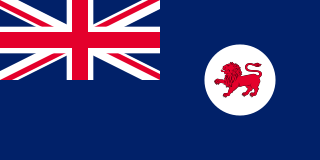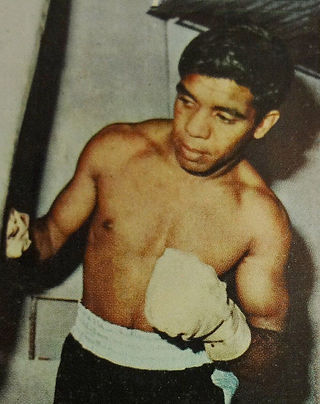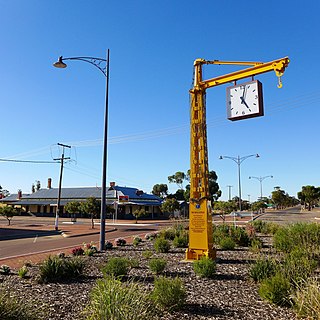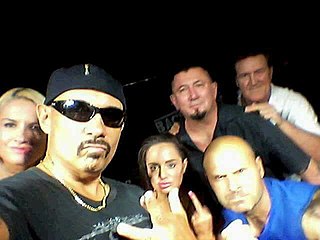Related Research Articles

Tasmania is an island state of Australia. It is located 240 kilometres (150 miles) to the south of the Australian mainland, separated from it by the Bass Strait, with the archipelago containing the southernmost point of the country. The state encompasses the main island of Tasmania, the 26th-largest island in the world, and the surrounding 1000 islands. It is Australia's least populous state, with 569,825 residents as of December 2021. The state capital and largest city is Hobart, with around 40 percent of the population living in the Greater Hobart area. Tasmania is the most decentralised state in Australia, with the lowest proportion of its residents living within its capital city.

The Aboriginal Tasmanians are the Aboriginal people of the Australian island of Tasmania, located south of the mainland. For much of the 20th century, the Tasmanian Aboriginal people were widely, and erroneously, thought of as being an extinct cultural and ethnic group that had been intentionally exterminated by white settlers. Contemporary figures (2016) for the number of people of Tasmanian Aboriginal descent vary according to the criteria used to determine this identity, ranging from 6,000 to over 23,000.

Lionel Edmund Rose MBE was an Australian professional boxer who competed from 1964 to 1976. He held the undisputed WBA, WBC, and The Ring bantamweight titles from 1968 to 1969, becoming the first Indigenous Australian to win a world title. He later became the first Indigenous Australian to be named Australian of the Year.

Truganini, also known as Lallah Rookh was an Aboriginal Tasmanian woman. She was one of the last native speakers of the Tasmanian languages and one of the last individuals solely of Aboriginal Tasmanian descent.

George Augustus Robinson was a British-born colonial official and self-trained preacher in colonial Australia. In 1824, Robinson travelled to Hobart, Van Diemen’s Land, where he attempted to negotiate a peace between European settlers and Aboriginal Tasmanians prior to the outbreak of the Black War. He was appointed Chief Protector of Aborigines by the Aboriginal Protection Board in Port Phillip District, New South Wales in 1839, a position he held until 1849. He is also remembered today for his role in the supply of Aboriginal remains to English 'collectors'.

Toodyay, known as Newcastle between 1860 and 1910, is a town on the Avon River in the Wheatbelt region of Western Australia, 85 kilometres (53 mi) north-east of Perth. The first European settlement occurred in the area in 1836. After flooding in the 1850s, the townsite was moved to its current location in the 1860s. It is connected by railway and road to Perth. During the 1860s, it was home to bushranger Moondyne Joe.

John Batman was an Australian grazier, entrepreneur and explorer. He is best known for his role in the founding of Melbourne.

Narembeen is a town in the Wheatbelt region of Western Australia. It is 286 km, almost due east, from Perth, the capital of WA. It is the major settlement in the Shire of Narembeen, in which the major industries are growing cereal crops and raising cattle and sheep. The surrounding areas produce wheat and other cereal crops. The town is a receival site for Cooperative Bulk Handling.

Anthony Steven Mundine is an Australian former professional boxer and rugby league footballer. In boxing he competed from 2000 to 2021, and held the WBA super-middleweight title twice between 2003 and 2008. He also held the IBO middleweight title from 2009 to 2010, and the WBA interim super-welterweight title from 2011 to 2012. Mundine is well known for his heated rivalries with fellow Australians Danny Green and Daniel Geale.

Paul Fenech is an Australian filmmaker, film and television actor, director, producer and writer. He is best known for writing, directing, producing and starring in the television series Pizza, Swift and Shift Couriers, Housos,Bogan Hunters, Fat Pizza: Back in Business, Housos vs. Virus: The Lockdown and Darradong Local Council as well as the motion pictures Fat Pizza (2003), Housos vs. Authority (2012), Fat Pizza vs. Housos (2014) and Dumb Criminals: The Movie (2015).

Julia Zemiro is a French-born Australian television presenter, radio host, actress, singer, writer and comedian. She is best known as the host of the music quiz and live performance show RocKwiz. Zemiro is a fluent French speaker and has acted in French.

James Sharman was an Australian boxing troupe and entertainment impresario. His son also worked with him and took over for his father in 1955 after playing as a professional rugby league footballer.

Sleeping Car to Trieste is a 1948 British comedy thriller film directed by John Paddy Carstairs and starring Jean Kent, Albert Lieven, Derrick De Marney and Rona Anderson. It was shot at Denham Studios outside London. The film's sets were designed by the art director Ralph Brinton. It is a remake of the 1932 film Rome Express.

Tasmanian Gothic is a genre of Tasmanian literature that merges traditions of Gothic fiction with the history and natural features of Tasmania, an island state south of the main Australian continent. Tasmanian Gothic has inspired works in other artistic media, including theatre and film.
Kaiya Jones is a Scottish-born Australian actress, best known for playing the role of Sophie Ramsay in the Australian soap opera Neighbours. She previously played Jess Cooper in the third series of The Saddle Club. Jones wrote and directed a short film called Coping, which was screened at Tropfest in 2013. In 2014, she joined the cast of Party Tricks.

The Chiltern Hundreds is a 1949 British politically-themed comedy film directed by John Paddy Carstairs, adapting William Douglas Home's 1947 play of the same name and starring Lana Morris, David Tomlinson and Cecil Parker.
Come Out Fighting is a short 1973 Australian feature directed by Nigel Buesst.
Michael Noonan is an Australian filmmaker, author and academic. He is a seven-time finalist at Tropfest, the world's biggest short film festival, a two-time AWGIE nominee, and winner of Best Documentary at the Inside Film Awards.
Rick Donald is an Australian actor, writer and director. He attended the National Institute of Dramatic Art (NIDA) and made his first television appearance in Sea Patrol. This was followed by recurring or guest roles in Paper Giants: The Birth of Cleo, Crownies, Home and Away and Underbelly: Razor. Donald played Constable Daniel Parks in The Doctor Blake Mysteries and Mr. Tuck in House Husbands, before relocating to the United States where he starred in the 2014 sitcom Friends with Better Lives.
Clarence Ryan is an Australian actor.
References
- ↑ Filming locations at IMDb
- ↑ "September the first", Herald Sun, 29 November 2007
- ↑ "September". Rotten Tomatoes . Retrieved 1 August 2023.
- ↑ Diwell, Stuart (2 December 2007), "Time to grow up", The Sunday Tasmanian
- ↑ Williams, Evan (1 December 2007), "September (M)", The Australian
- ↑ Lowing, Rob (2 December 2007), "A delicate tale to savour of youth at crossroads – Reviews", The Sun Herald
- ↑ Edwards, Russell (14 September 2007), "September", Variety
- ↑ Interview Peter Carstairs Archived 11 October 2014 at archive.today at Melbourne International Film Festival, 2008
- ↑ ASSG Awards 2008 at IMDb
- ↑ IF Awards 2008 at IMDb